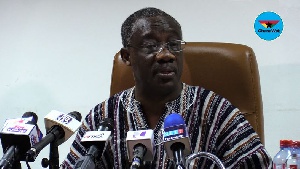 Emmanuel Kofi Nti, Commissioner General of Ghana Revenue Authority
Emmanuel Kofi Nti, Commissioner General of Ghana Revenue Authority
The Ghana Revenue Authority (GRA) failed to meet its target of raising GH¢24. 5 billion at the end of August 2018.
Instead, it managed to mobilise a total of GH¢22.7 billion representing a revenue shortfall of about GH¢1.8 billion.
Mr Eugene Asante Ofosuhene, the Controller and Accountant General, said this at a sensitisation programme on the GRA’s “withholding VAT” for the staff of his outfit in the Central and Western regions in Cape Coast.
Withholding VAT (WVAT) is a mechanism to account for and pay VAT on supply of goods and services by the person making the payment.
The engagement was a collaborative exercise under the auspices of the Ministry of Finance, GRA and the Controller and Accountant General's Department (CAGD).
The initiative was geared towards empowering the participants to enable them fulfil their meaningful roles in revenue generation and mobilisation to spearhead national development.
Mr Ofosuhene said evading tax was socially unacceptable and "honouring tax obligations would help to mobilize sufficient revenue for the national kitty to accelerate development."
He said: "It is disheartening to note that efforts being made by government to raise revenue for infrastructural development and all round transformation aimed at lifting the vast majority of our people out of abject poverty are thwarted by a shortfall in revenue generation”.
"Our nation today is at the crossroads for the attainment of unprecedented growth and development”.
"With policies like free SHS and the 'One District One Factory', the onus is on us as treasury officers to assist in all spheres of our duties to protect the public as well as improve and enhance revenue generation".
He said no nation can develop without an effective mobilisation of taxes and observed that people by nature would resist the payment of taxes.
Therefore, the GRA and partners has scaled up public education and designed strategies for tax collection including the Value Added Tax (VAT) and the Withholding VAT.
Explaining the WVAT processes, he said it was the responsibility of the GRA through the Commissioner General to appoint WVAT Agents to withhold a portion of VAT on payments made to a VAT registered supplier who is a standard Rate Operator for the Agent to remit to the GRA.
Mr Ofosuhene said WVAT was not a new VAT or tax regime but had been in existence under the Value Added Tax Withholding Amendment Act, (Act 954), 2017.
He said WVAT placed a high advantage on increasing voluntary registration, enhancing compliance of tax law and generally improve revenue inflows into government treasury.
Mr Victor Donkor, Central Regional Director of the Controller and Accountant General's Department, urged revenue officers to do more to achieve its target for the year.
The Regional Director said government has a mission of carrying out numerous projects and initiatives; however, these could not be achieved if officers mandated to mobilize domestic tax revenue were not equal to the task.